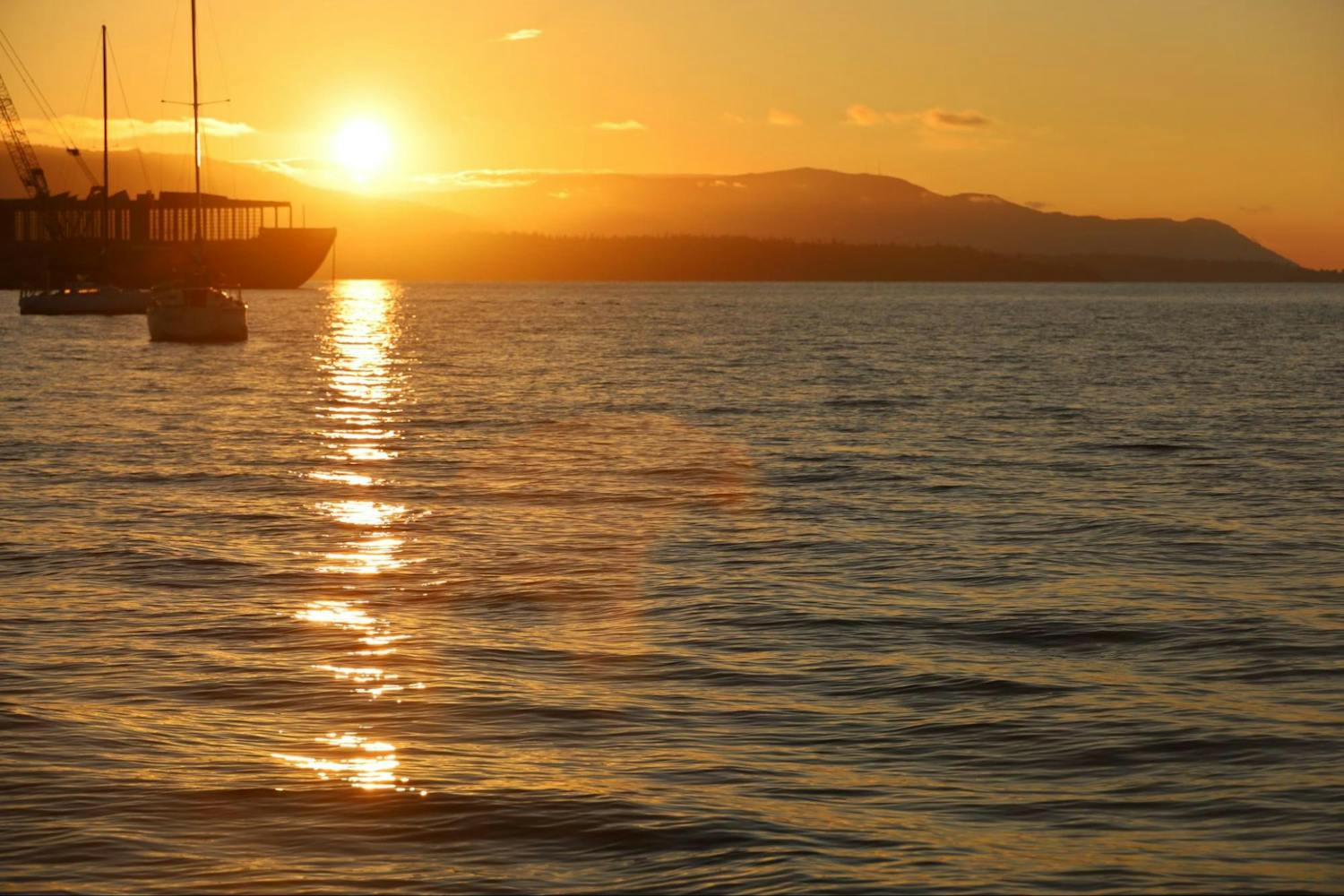Just outside of Fairhaven’s historic district in Bellingham, a group of hardened souls gather at Taylor Dock each evening at 4:30 p.m. to take part in a collective cold plunge.
It all started in November 2022, when Caleb Barville and his buddy Jaden Miller thought it would be a fun challenge to plunge into Bellingham Bay every day. Snow, ice and torrential downpours didn’t stop them.
When word-of-mouth sparked curiosity and drew in more people, Barville and Miller formed an official Cold Plunge Club at Western Washington University in March 2023.
“It was a nice little group of people and a great way to hang out and all suffer together,” Barville said. “It’s a great bonding experience. So we’re like, might as well make it a club, this could be awesome.”
Barville, the president of the club, said he always held a connection with the water.
“It becomes one with you," he said. "I feel very comfortable in any body of water. It’s my grounding feeling.”
Growing up in Kona, Hawaiʻi, Barville developed a fascination for the ocean and water sports and is now a professional kayak guide in the summers, leading trips out of the San Juan Islands.
While working in the San Juans, he developed a daily practice of jumping into the cold water to challenge himself and start the day off on a positive note. It was a mental and physical revelation that would ultimately become a big part of his life.
“I think cold plunging is a really great way to build mental resilience and discipline," Barville said. "Consistent exposure to cold temperatures allows the mind to get comfortable in a state of discomfort, which will improve its ability to deal with other types of stress."
There are many experts who have studied the benefits of cold immersion. One of these is Andrew Huberman, a neuroscientist and tenured professor at Stanford University. He hosts a podcast, The Huberman Lab, that informs listeners about all things science.
“Importantly, [cold plunging] is a skill that carries over to situations outside of the deliberate cold environment, allowing you to cope better and maintain a calm, clear mind when confronted with real-world stressors,” Huberman said. “In other words, deliberate cold exposure is great training for the mind.”
Barville said that based on the temperature readings, Bellingham Bay is currently around 49 degrees Fahrenheit, and it will be at its lowest point within the first three months of 2024 at about 41 degrees Fahrenheit. While the water temperature may not shift much throughout the year, it's the air temperature that becomes a factor.
“When you get out and the air is colder than in the water, you’re just consistently losing heat in your body and you're just going to start shivering,” Barville said.
This doesn’t stop people from going to the plunges and testing themselves with the act of cold exposure.
Colby Nichols, a member of the Cold Plunge Club and first-year at Western, has been joining in on plunges ever since they started up again in September.
Nichols likes how convenient it is to show up for a plunge. He said it was just a matter of showing up, staying in the water for a few minutes, and getting out. It’s not a big time commitment.
“I go home feeling better than when I came to the club, so it's like a sense of accomplishment,” Nichols said. “I feel like it could help your mental apparatus just by jumping in and getting out and feeling like you did something.”
Everyone has their own reasons that draw them back. For club member Bee Bagley, it’s the energetic feeling the cold water leaves her with.
“I love the adrenaline that you get, and it’s refreshing,” Bagley said. “You don’t really feel cold other than the first few seconds, and then you just get used to it and just get to float around and hang out.”
Huberman noted the scientific explanation for this increase in adrenaline.
“Deliberate cold exposure causes a significant release of epinephrine and norepinephrine in the brain and body,” Huberman said. “Cold causes their levels to stay elevated for some time and their ongoing effect after the exposure is to increase your level of energy and focus, which can be applied to other mental and/or physical activities.”
While cold water immersion is generally considered safe, it is recommended those with preexisting health conditions consult their health-care provider. There are associated risks that one should be aware of before taking the plunge.
“Hypothermia is always a viable risk,” Barville said. “My personal recommendation is to dry off as soon as you're out of the water and put on clothes in a timely manner. Especially if you stay in the water for a long time, since you have about 10 minutes once you get out before you start uncontrollably shivering.”
While Western's Cold Plunge Club may not be for the faint of heart, the sense of community creates an environment that radiates a buoyant energy, made up of like-minded individuals putting themselves out of their comfort zone.
“It's a great community and a great experience for people to join in on,” Barville said. ”If you're looking for a community in the winter time where seasonal depression is more prevalent, then you’re doing that deliberate cold exposure. It doesn’t have to be every day, it could just be one day, two days a week.”
Evan Riley (he/him) is a city life reporter for The Front this quarter. He is a fourth-year student at Western working towards his major in News/Editorial journalism. He has dreams of becoming a travel writer and is continually thinking about where he'll go next.
You can reach him at evanriley.thefront@gmail.com









